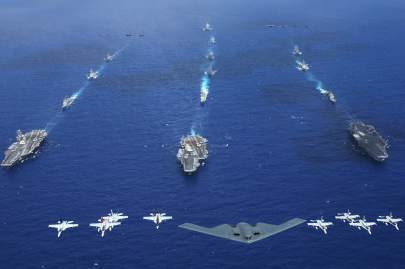Navy Birthday, Navy Anniversary

The Navy Turns 248
"A good Navy is not a provocation to war. It is the surest guaranty of peace." - Theodore Roosevelt
"I can imagine no more rewarding a career. And any man who may be asked in this century what he did to make his life worthwhile, I think, can respond with a good deal of pride and satisfaction: 'I served in the United States Navy.'" - John F. Kennedy
October 13 marks the birthday of the U.S. Navy, which traces its roots back to the early days of the American Revolution. On October 13, 1775, the Continental Congress established a naval force, hoping that a small fleet of privateers could attack British commerce and offset British sea power.
The early Continental Navy was designed to work with privateers to wage tactical raids against the transports that supplied British forces in North America. To accomplish this mission, the Continental Congress purchased, converted, and constructed a fleet of small ships -- frigates, brigs, sloops, and schooners. These navy ships sailed independently or in pairs, hunting British commerce ships and transports.
Two years after the end of the war, the money-poor Congress sold off the last ship of the Continental Navy, the frigate Alliance. But with the expansion of trade and shipping in the 1790s, the possibility of attacks from European powers and pirates increased, and in March 1794, Congress responded by calling for the construction of a half-dozen frigates The United States Navy was here to stay.
Fullscreen
With thousands of ships and aircraft serving worldwide, the U.S. Navy is a force to be reckoned with. Below are just some of the Navy's notable accomplishments over the past two centuries:
Important Firsts in Naval History
*The first use of submarines: While the Navy's first commissioned designs for a submarine were handed over in 1875, it wasn't until 1898 that the first Holland submarine launched successfully.
*The first use of modern battleships: While America had battleships before the 1908 South Carolina class dreadnought, which started with the USS Michigan and was based on British ships, these were the first in the new era of battleships.
*The first use of Naval aircraft: In 1911, the U.S. Navy bought its first airplane, the Curtiss A-1 Triad.
*The first aircraft carrier: The first flight from the deck of a U.S. Navy cruiser in 1910 led to the 1927 Lexington-class aircraft carriers, the first operational aircraft carriers in the U.S. Navy.
*The first use of Rigid Hull Inflatable Boat: Introduced in 1992, these rubber boats were originally meant for life boats in the 1960s, but the Navy now uses them for SEALs due to their lightweight, high speed, all-weather specifications.




